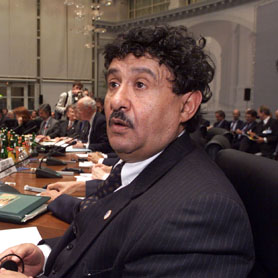Gaddafi regime seeking talks ‘to stop the killing’
Libya’s former Prime Minister Abdul Ati al-Obeidi tells Channel 4 News that Gaddafi’s regime is trying to set up talks with western powers to stop the war.
Foreign Affairs correspondent Jonathan Rugman spoke to Obeidi in Tripoli, and was told that Gaddafi’s regime was trying to open lines of communication to find a ceasefire:
“We are trying to talk to the British, the French and the Americans to stop the killing of people,” said Obeidi.
“We are trying to find a mutual solution.”
Mohamed Ismail, one of Libya’s highest ranking political aides, and a representative for Colonel Gaddafi‘s son Saif, is believed to have flown to London in the past few days seeking to broker an end to the conflict.
Obeidi told Channel 4 News that he had “not seen Ismail for a week.”
Ismail’s reported visit came in the same week that Foreign Minister Moussa Koussa defected from the regime when he flew into Farnborough airport.
“We are trying to talk to the British, the French and the Americans to stop the killing of people”. Abdul Ati Al-Obeidi
Obeidi’s comments confirm US Secretary of State Hillary Clinton‘s claims earlier this month that said she was aware that people close to Gaddafi had been trying to make contact.
When he was Libya’s ambassador to Rome, Obeidi was one of three negotiators – along with then head of external intelligence Koussa – who thrashed out a deal with British officials to to stop Libya’s nuclear weapons programme.
He insisted that there would be no further high-level defections, following that of Mr Koussa’s.
“After Mr Moussa Koussa, nobody has left,” he said. “Defection does not help solve the problem.”
Channel 4 News special report - Libya war: strike against Gaddafi
Obeidi denied reports of other high-profile flights from Gaddafi’s inner circle, including his own. He was “a hundred per cent in Tripoli” despite claims that he is on a list of senior figures who have fled the country. He also vouched for oil minister, Shokri Ghanem and the head of external security, Omar Abu Said Dudali. “We are all here,” he said.

He added that a former foreign minister, Ali Abdussalam al-Treki, had not defected as such after turning down the post of UN Ambassador. It has been reported that Mr al-Treki defected in Egypt. “He is not doing any job but he is free to come and go,” Obeidi said.
When asked whether a solution involved the stepping down of Colonel Gaddafi, Obeidi said that UN Security Council resolution 1973, authorising the protection of Libyan civilians, made no mention of the Gaddafi family. “We should concentrate on democracy and a constitution,” he said, “which we are already doing.”
Meanwhile, defectors from the Libyan regime will receive “no immunity” from prosecution, according to Foreign Office minister Lord Howell.
His comments came at the start of a full-day House of Lords debate on Libya.
In pictures: photo gallery - allied airstrikes on Libya
Prime Minister David Cameron said on Thursday that Mr Koussa had not been offered immunity from prosecution in return for information he may be able to provide about Gaddafi’s military struggle with rebel forces.
The government is under growing pressure to hold Mr Koussa, who resigned as Libya’s foreign minister this week, to account for the Lockerbie bombing and the murder of policewoman Yvonne Fletcher.
Opening the debate, which will not end with a vote but is otherwise the Lords equivalent of the high-profile Commons debate at the beginning of the intervention in Libya, Lord Howell stressed the global support for the UK’s stance.
He told peers: “There is wide support for what we are doing in Libya – from the United Nations, the Arab League, the African Union and most of Europe.
“We are doing our full bit, more than our bit, in carrying out our duty.”
He added: “The case for this action remains utterly compelling. Appalling violence against Libyan citizens continues to take place, exposing the regime’s claims to have ordered ceasefires to be an utter sham.”